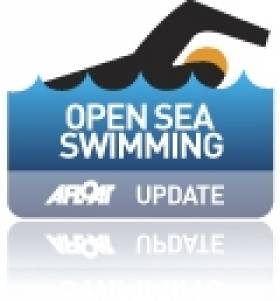Displaying items by tag: charity swim
Charity Swim Guidelines Issued by Water Safety Ireland
Water Safety Ireland has urged organising Charity swims on Christmas Day, St. Stephen’s Day or New Year’s Day to ensure that they provide comprehensive details of each event to the Irish Coast Guard and local Gardaí.
Each event should have a Safety Officer appointed, who will advise those concerned on safety and have the ultimate responsibility for making decisions in relation to the swim being on or off on the day.
If the seas are rough and weather deteriorates, they should defer the event to a more suitable day without question – if in doubt do not take a chance on running the event.
Many participants will not have swum since the summer and the temperature of the water has now dropped considerably. It is a fallacy that alcohol will keep you warm when entering the water; in fact it has the reverse effect and could kill you. No alcohol should be taken before or after the swim.
Cold water can cause cold shock and hypothermia in minutes, because the temperature of the water at this time of year will be below 6° Celsius in Fresh Water and 11° Celsius in Seawater.
Ensure that you have safe access and egress with appropriate shallow shelving beaches, steps, slipway or ladders as appropriate. Elderly people should be mindful that steps leading into the water might be dangerous due to the increased growth of algae in wintertime. Organisers must ensure that they have had the access and egress cleaned in advance of the swim to avoid slips and falls.
Fancy dress outfits can seriously impair your ability to float – please do not wear when swimming.
Swimmers’ remaining in the water for extended periods in a gesture of bravado is not acceptable and leads to hypothermia. Our message is “Get In, Get Out and Warm Up”.
Furthermore, thousands of people are at risk when walking by rivers, lakes and shorelines. Others are lulled into a false sense of security when visiting relatives living close to water hazards such as slurry pits, ponds, exposed drains and canals.
Charity Swim guidelines:
- People organising these swims on Christmas Day, St. Stephen’s Day or New Year’s Day should ensure that they provide comprehensive details of each event to the Irish Coast Guard and local Gardaí.
- Each event should have a Safety Officer appointed, who will advise those concerned on safety and have the ultimate responsibility for making decisions in relation to the swim being on or off on the day.
- If the seas are rough and weather deteriorates, they should defer the event to a more suitable day without question – if in doubt do not take a chance on running the event.
- Many participants will not have swum since the summer and the temperature of the water has now dropped considerably. It is a fallacy that alcohol will keep you warm when entering the water; in fact it has the reverse effect and could kill you. No alcohol should be taken before or after the swim.
- Cold water can cause cold shock and hypothermia in minutes, because the temperature of the water at this time of year will be below 6° Celsius in Fresh Water and 11° Celsius in Seawater.
- Ensure that you have safe access and egress with appropriate shallow shelving beaches, steps, slipway or ladders as appropriate. Elderly people should be mindful that steps leading into the water might be dangerous due to the increased growth of algae in wintertime. Organisers must ensure that they have had the access and egress cleaned in advance of the swim to avoid slips and falls.
- Fancy dress outfits can seriously impair your ability to float – please do not wear when swimming.
- Swimmers’ remaining in the water for extended periods in a gesture of bravado is not acceptable and leads to hypothermia. Our message is “Get In, Get Out and Warm Up”.
Channel Attempt swim by Waterford Firefighter
Alan Smith (39), from Ashley Court, hopes to achieve a lifetime ambition by completing the 21-mile swim across the channel on September 26th next.
Alan is a lifelong member of Waterford Crystal Swimming Club, the Channel swim will involve Alan being in the water for over 14 hours and will swim 30 miles navigating the strong currents and tidal stream of the English Channel.
A naval diver for nine years who currently works as a firefighter in the city, he wants to raise much-needed capital for the building of the South Eastern Cancer Foundation (SECF) Solas Centre at Williamstown in Waterford.
A window of opportunity has been opened from September 26th to October 4th but is still weather dependant. The October date marks the fifth anniversary of the death of his father Des (69), a founding member of the swimming club, who died of cancer.
In an interview with the Irish Times today, Alan said: “There’s not a family in the town that hasn’t been touched by cancer. It’s not a nice time – it’s great to know that they [the SECF] are there.”
Up to €250,000 is needed to finish the Solas Centre project – to fit out the building and open the expanded service. Construction on the centre started in May.
Waterford City Council has provided the site, close to Waterford Regional Hospital, and over €1.25 million has been raised to date. Alan hopes to raise €5,000 as part of the fundraising drive, funded entirely through donations. You can donate to Alan’s charity on www.mycharity.ie under ‘Alan Smith’s English Channel Swim’






























































